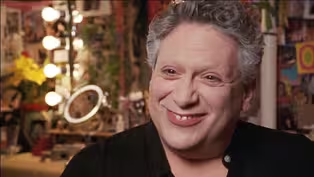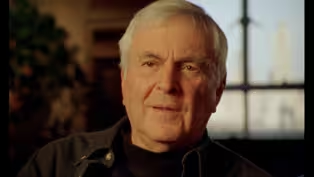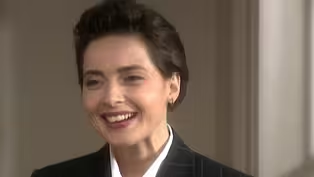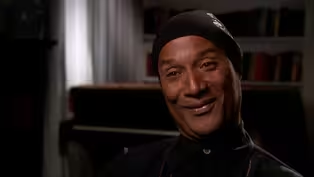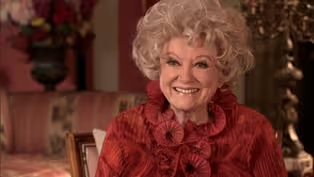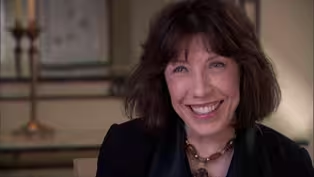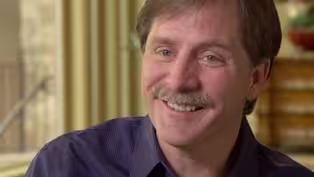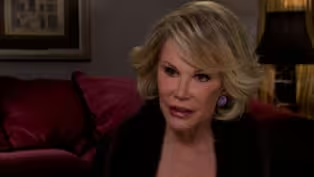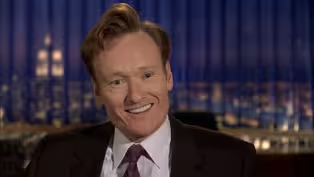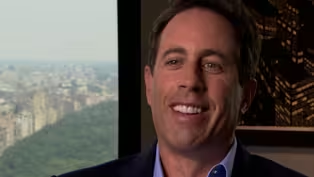
Mel Brooks' wild ride to his first Broadway show ever
Special | 5m 44sVideo has Closed Captions
Mel Brooks talks about the first Broadway show he ever saw—Cole Porter's "Anything Goes."
In this interview from 2003, actor, comedian and producer Mel Brooks talks about the first Broadway show he ever saw—Cole Porter's "Anything Goes." He also talks about what makes the Broadway musical uniquely American and special. Interview conducted by Michael Kantor for "Broadway: The American Musical" (2004).
Problems playing video? | Closed Captioning Feedback
Problems playing video? | Closed Captioning Feedback
Support for American Masters is provided by the Corporation for Public Broadcasting, AARP, Rosalind P. Walter Foundation, Judith and Burton Resnick, Blanche and Hayward Cirker Charitable Lead Annuity Trust, Koo...

Mel Brooks' wild ride to his first Broadway show ever
Special | 5m 44sVideo has Closed Captions
In this interview from 2003, actor, comedian and producer Mel Brooks talks about the first Broadway show he ever saw—Cole Porter's "Anything Goes." He also talks about what makes the Broadway musical uniquely American and special. Interview conducted by Michael Kantor for "Broadway: The American Musical" (2004).
Problems playing video? | Closed Captioning Feedback
How to Watch American Masters
American Masters is available to stream on pbs.org and the free PBS App, available on iPhone, Apple TV, Android TV, Android smartphones, Amazon Fire TV, Amazon Fire Tablet, Roku, Samsung Smart TV, and Vizio.
Buy Now
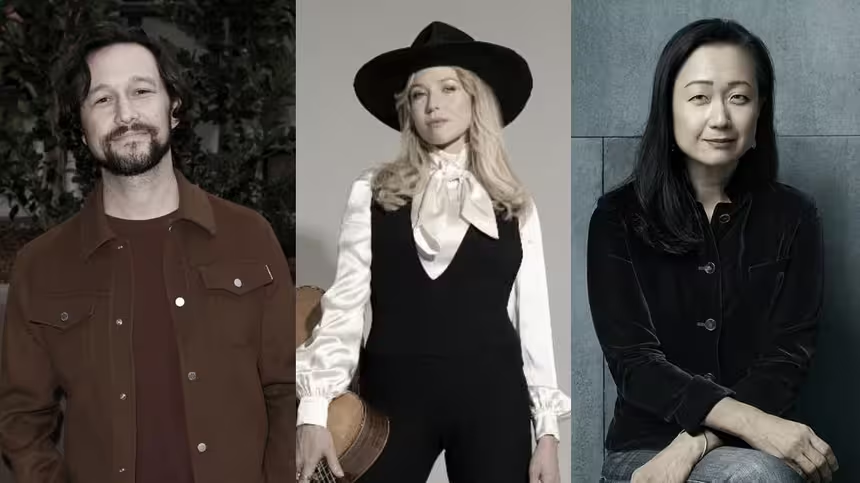
A front row seat to the creative process
How do today’s masters create their art? Each episode an artist reveals how they brought their creative work to life. Hear from artists across disciplines, like actor Joseph Gordon-Levitt, singer-songwriter Jewel, author Min Jin Lee, and more on our podcast "American Masters: Creative Spark."Providing Support for PBS.org
Learn Moreabout PBS online sponsorshipMore from This Collection
Watch curated interviews from The American Masters Digital Archive. The full collection includes over 1,000 hours of never-before-seen, raw interviews: a treasure trove of the movers and shakers of American culture, including Maya Angelou, Patti Smith, Mel Brooks, Carol Burnett, Matthew Broderick, Carl Reiner, Joan Rivers, Dionne Warwick, Lee Grant, Sidney Lumet, Betty White and many others.
Harvey Fierstein on gay representation on Broadway and its deep history
Video has Closed Captions
Harvey Fierstein talks to director Michael Kantor backstage during the production of "Hairspray." (13m 8s)
Video has Closed Captions
Ringo Starr describes his friendship with Mae West. (10m)
John Kander and Fred Ebb on “Cabaret,” creativity and collaboration
Video has Closed Captions
Composer John Kander and lyricist Fred Ebb talk about how they have worked together. (5m 56s)
Isabella Rossellini compares her acting and modeling
Video has Closed Captions
Isabella Rossellini discusses her acting versus modeling career. (28m 24s)
Quincy Jones explains how he got started in music
Video has Closed Captions
Quincy Jones discusses his early career, friendships and how he defines himself. (15m)
Paul Mooney on his career and relationship with Richard Pryor
Video has Closed Captions
Paul Mooney reflects on the mechanics of stand-up and his role as Richard Pryor's best friend. (10m 39s)
How Phyllis Diller broke down the doors for female comics
Video has Closed Captions
Phyllis Diller reflects on how her comedy was a response to years of “take my wife” jokes. (11m 35s)
How Lily Tomlin found liberation in exploring her Laugh-In characters
Video has Closed Captions
Lily Tomlin speaks about her time on Laugh-In and how she developed her characters. (12m 35s)
Jeff Foxworthy on how every American might be a "redneck"
Video has Closed Captions
Jeff Foxworthy discusses regionalism in comedy and why "redneck" is a state of mind. (15m 41s)
Joan Rivers finds humor in being yourself
Video has Closed Captions
Joan Rivers speaks about her experience as a female comic in the early 60s. (9m 59s)
Conan O’Brien gets serious about silliness
Video has Closed Captions
Conan O’Brien speaks about his style of late night and his reason for doing comedy. (15m 32s)
Jerry Seinfeld on his place in American sitcom history
Video has Closed Captions
Jerry Seinfeld discusses his collaboration with Larry David and the evolution of the sitcom. (16m 1s)
Providing Support for PBS.org
Learn Moreabout PBS online sponsorship- In 1935, my Uncle Joe drove a Parmalee Cab.
It was a big checker cab, very big cab.
And in the front, there was a place with straps where you could actually put your luggage on a big kind of running board.
And he was the driver.
But in the back, there was room, there were folding seats, and there was room for about four people.
When a Parmalee Cab came down South 3rd Street and Hooper, where I lived in Williamsburg, and there was no driver!
And it appeared to be driving by itself.
We knew it was Uncle Joe!
Because Joe was about 4'3" and had to sit on many telephone books.
Remember the telephone was just invented, so you needed (chuckling) many books, there was nobody in the book!
Many telephone books to get high enough to get to the wheel, and he could just about see over the wheel, but we couldn't see his head.
Joe was given two tickets to Cole Porter's new show, which was "Anything Goes."
And I was about nine or nine and a half.
And he said, "How would you like to see a Broadway show?"
And I said, "Wha, wha, wha, what is it?
What's a Broadway show?"
And he says, "Well, people sing and dance on the stage," and you know."
I said, "Oh!
Oh, it's like a movie!"
A guy only knew movies, I didn't know what Broadway was.
He said, "No, it's better!
Melvin, it's thrilling!
I'm gonna take you to see your first Broadway show," my Uncle Joe.
So, he puts me in his cab, and went South 3rd Street and Hooper, I get in his cab, he says, "Lay down in the back!
Because I got the flag up!
If they see a person in the back with the flag up, we're both arrested!
We can't, it's illegal."
So, he doesn't throw the flag, he leaves the flag up!
I'm on the bottom!
I can only see from the bottom of the cab, I see.
When I began to see girders, I knew we were crossing the Williamsburg Bridge!
So I said, "That's good!"
And then I saw a glimpse of the Chrysler Building, I knew we were going uptown!
And so, things were good!
But then you could park!
1935, the street, you park fine!
There's no signs, there's no nothing!
There were no cars!
I mean, you were probably the only car on the block!
Then I see right outside the Alvin Theater, parks the cab.
We go in, they tear the tickets, we turn left, we go up some stairs, we go around, we go up some more stairs.
We go around, we go up some more stairs!
I'm beginning to find heart to breathe.
We are in (chuckling) the top of the Alvin, we're in the top last row of the Alvin Theater.
They start to play.
We sit down, the lights hit a maroon curtain, rich, velvety maroon curtain, and they play an overture.
One song after another.
Anything goes itself.
(humming) (hands tapping) Anything goes!
And then you're the top.
♪ You're the Colosseum, you're the top ♪ ♪ You're the Louvre music ♪ I mean, it's just one lyric, one song after another, and then.
♪ All through the night, ladada ♪ Well, all these Russian Jewish melodies that came from Cole Porter was amazing!
Anyway, I loved!
(hand swishing) With just one song after another!
And then the curtain opened, and there was William Gaxton, and there was Ethel Merman!
And I had no mics!
And I was sitting in the last row with Uncle Joe of the balcony!
And Ethel Merman started to sing, and I had to hold my, she was very, (chuckling) she had a big voice!
Anyway, it was the most thrilling experience of my life, and I said to Joe, yelling from the back of the floor, "I'm gonna do that one day, Uncle Joe, I'm gonna do that, I love that!
I've never seen anything like that!"
And he said, "Okay, kid, you can do it!"
And that's one of the songs and the producers, you can do it!
So.
And I did do it!
It took me maybe 60 years to get there, but I did it.
Musical comedies are diamonds!
The other shows I talked about may be rubies, may be emeralds!
And they may be amethysts, but they're not diamonds!
A musical comedy is so hard to do and so hard to get right that when you get "Bells Are Ringing" and you get an honor way to the forum, or you get "Guys and Dolls," maybe the greatest musical comedy, you're getting a diamond!
Because not only are you being touched by some of the emotion, but you're laughing your head off and you're keeping time to the most wonderful music in the world.
Look at the musical comedies we have exported!
They say happiness, they say hope.
They say esprit de corps, they say all the things they say, we're tough.
They say we can survive.
They say, we're sharp!
We're hip, we're America!
And it's the Broadway musical!
That is the most unique, artistic event that distinguishes us from every other country in the world.
Nobody can make a musical comedy like Americans.
And you ask George M. Cohan, "Yankee Doodle Dandy," he'll tell you.
And so I'm very proud to be part of it, even in a small way!
Support for PBS provided by:
Support for American Masters is provided by the Corporation for Public Broadcasting, AARP, Rosalind P. Walter Foundation, Judith and Burton Resnick, Blanche and Hayward Cirker Charitable Lead Annuity Trust, Koo...

